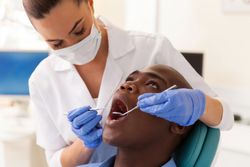3 Types of Dental X-Rays & Why They're Used

When visiting your dentist, it’s not uncommon to undergo an X-ray. These diagnostic procedures are used to look for hidden issues with your teeth, such as developing cavities or impacted wisdom teeth. Dentists use a variety of X-rays, each of which serves a distinct purpose.
A Guide to Common Types of X-Rays
1. Periapical
Periapical (PA) X-rays are capable of capturing an image of the entire tooth, from the crown to the area where the root is attached to the jaw bone. To take a PA X-ray, dentists use a device that consists of a metal rod and ring, which is situated at one end.
You’ll be asked to bite down on the device so the ring is surrounding the area being imaged. PA X-rays are often used to assess the health of the jaw bone and tooth root, which can be compromised by infection or decay.
2. Bitewing
 Unlike PA X-rays, bitewings capture your teeth above the gum line and a portion of the root, as opposed to the entire tooth. They’re integral in identifying decay hiding between teeth, which can be difficult to detect otherwise.
Unlike PA X-rays, bitewings capture your teeth above the gum line and a portion of the root, as opposed to the entire tooth. They’re integral in identifying decay hiding between teeth, which can be difficult to detect otherwise.
To take a bitewing X-ray, your dentist will place a cardboard or plastic film in your mouth, which is kept stable when you bite down on it. An X-ray camera will then be positioned near your mouth to capture the image.
3. Full Set or Full Mouth
Dentists sometimes combine X-ray techniques to get a comprehensive view of your oral health. This is the case with full mouth X-rays, which are also referred to as a full set. Taking individual photos of each area of the mouth—which entails undergoing both bitewing and PA—provides insight into cavities, abscesses, impacted teeth, bite, and jaw bone health.
Full mouth X-rays are usually taken when a patient visits a new dentist for the first time, as they establish a baseline for oral health going forward.
Preventative care is crucial to prevent cavities, gum disease, and other oral hygiene issues. Since 1984, Anthony J. Adams, DDS - Healthy Body Dental has provided essential dental services to patients in Pinellas County, FL. This clinic uses state-of-the-art X-ray equipment to diagnose underlying issues, such as decay. Visit the website before your appointment to access helpful dental forms. Call (727) 799-3123 to schedule an appointment today.
About the Business
Have a question? Ask the experts!
Send your question

